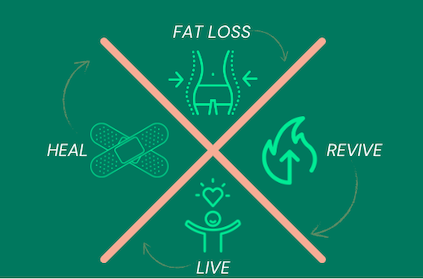Truths About Weight Loss
“When a Calorie Deficit Becomes Detrimental to Your Health”
You’ve probably heard or read that the ONLY way to lose weight is to be in a caloric deficit, right?
Well, what if you’ve been in a caloric deficit for weeks, months, or even years and still haven’t lost any or all of the weight you’re looking to shed?
Do we just stick it out and work out harder?
Do we cut calories more?
Do we jump to the next extreme diet like Optavia or Ozempic?
Let's dive in and talk about how deficits impact your body so we can help you understand what really needs to happen for you to start seeing progress again.
Calorie deficit, the state of consuming fewer calories than your body needs to maintain its current weight, is often associated with weight loss and a popular approach to achieving fitness goals. While a calorie deficit can be effective for shedding excess pounds, it’s crucial to understand that there’s a fine line between a healthy calorie deficit and a detrimental one.
When a calorie deficit becomes too severe or is sustained for an extended period, it can have detrimental effects on your health.
Here are a few key considerations:
Nutrient Deficiencies: Severely limiting your caloric intake can lead to inadequate consumption of essential nutrients, including vitamins, minerals, and macronutrients. Nutrient deficiencies can compromise your immune system, impair organ function, and contribute to a variety of health issues.
Metabolic Slowdown: Prolonged calorie restriction can cause your metabolic rate to slow down as your body attempts to conserve energy. This can make weight loss more challenging over time and lead to a cycle of diminishing returns.
Muscle Loss: When your body is in an extreme calorie deficit, it may turn to breaking down muscle tissue for energy, leading to muscle loss. Losing muscle mass can negatively impact your overall strength, physical performance, and even your metabolic rate.
Hormonal Imbalances: Drastic calorie deficits can disrupt the delicate balance of hormones in your body. Hormones involved in regulating metabolism, hunger, satiety, and reproductive function can be affected, leading to imbalances and potential long-term health consequences.
Psychological Effects: Restrictive diets can take a toll on your mental well-being. Constantly being in a state of deprivation can lead to feelings of frustration, obsession with food, low energy levels, mood swings, and a strained relationship with eating.
Yikes, right?! I don't want you to fear deficits, but I do want to arm you with the knowledge to be able to implement a deficit responsibly to optimize your goals and your health. You shouldn't be in a calorie deficit for more than 3-4 months a YEAR! And within those 3-4 months you should be closely monitoring your biofeedback (aka how your body is feeling from the inside out) so you know when it's time for a refeed or some carbohydrate cycling to keep your body happy and healthy.Also, consider this… what if we could heal and prime your metabolism so you didn’t have to go into a deficit to lose weight or start feeling good in your skin again? Did you know that deficits are only responsible for about 23% of weight/fat loss whereas food quality is responsible for 77.2% of weight/fat loss?!
Yes, food quality and the healing of your metabolism are THAT important.
When we are eating the right foods we are getting more appropriate hunger signals and satiety cues, in turn fueling your metabolism and increasing your body’s burning capacity.
If this sounds like an approach that vibes with you, we should probably chat. We would love to be a part of your journey and help you find the health, wellness, food freedom and body you’ve been working so hard for!
Fill out this form here for a free consultation:https://lifeelevatednutrition.com/contact/
You can also join our FB group here for challenges, recipes, fit friends, and more!


